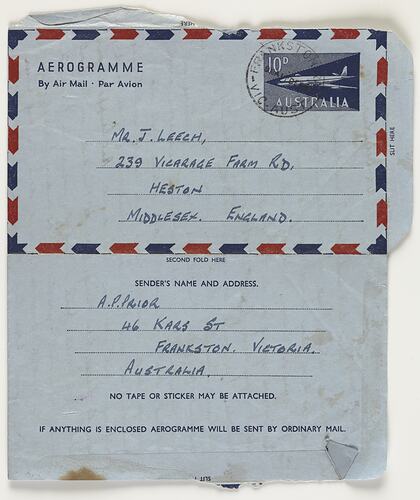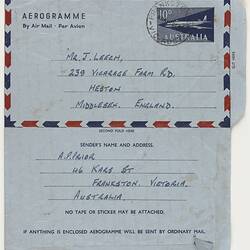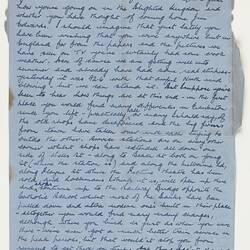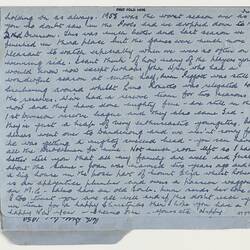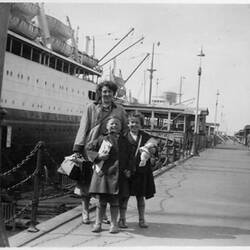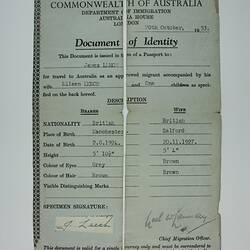Summary
Aerogram letter written to Jim Leech in Heston, Middlesex, England, dated 16 December 1959. It is from Frankston Soccer Club friend A.P. Prior, nickname 'Nippy', who refers to England as the 'Blighted Kingdom' and that 'I should imagine that just lately you have been wishing that you were anywhere but in England far from the papers and the pictures we have seen on TV you've certainly had some crook weather. Here of course we are getting well into summer and already have had some real stinkers...' He describes changes in Frankston, improved train services, reports on the Frankston Soccer Club and family news. James, Eileen and Susan Leech had migrated to Australia in November 1953 and returned to England in Febuary 1956.
James and Eileen Leech and their two and a half year old daughter Susan migrated from Manchester, England in November 1953 under the ten pound assisted migration scheme on the ship 'New Australia'. James, who had served with Australian soldiers during World War II was drawn to Australia while Eileen, with strong family ties, was reluctant to come. James was employed in his field as an optical mechanic and they lived in Sandringham and then Frankston. While James loved the new lifestyle, Eileen's homesickness led to depression and when she became pregnant, the family returned to England in January 1956 on medical advice on the 'Orion'. Eileen's mother loaned them the funds to relocate but James never fully recovered his disappointment at leaving Australia and the years living with Eileen's family while repaying the loan put a strain on the whole family. Eileen, who at one time had considered migrating to Australia, returned for the first time in 2014.
Physical Description
Aerogram letter, pale blue paper handwritten on both sides in blue ink.
Significance
Statement of Historical Significance:
This collection of primarily shipboard documents provides a rare opportunity to represent the experiences of post World War II assisted British migrants who subsequently returned to Great Britain. Of more than one million people who migrated from Great Britain from the late 1940s through to the 1970s over one quarter of them returned home (and 25% of those returned again to Australia). These migrants, often referred to as 'ten pound Poms' were part of a systematic series of post-war immigration policies and procedures which favoured British immigration into Australia. The Leech family only stayed in Melbourne for three years, Eileen finding homesickness to much to bear, not an uncommon reason for people deciding to return home.
Assisted British migration was a constant theme of Australian immigration history until the early 1980s. Government assistance initiatives had an enormous impact on the composition and size of the Australian population, and can be viewed within the broader context of building a white British nation, on the national agenda since Federation and the formalisation of the white Australia Policy through the Immigration Restriction Act of 1901. The relaxing of such policies after World War II in the desire to rapidly increase Australia's population which migration from the UK could not fulfil alone, saw Australia's immigration policies and its social, cultural and economic landscape change forever.
More Information
-
Collecting Areas
Migration, Migration & Cultural Diversity, Transport, Leisure
-
Acquisition Information
Donation from Susan Blunden, 05 Jun 2014
-
Recipient
-
Organisation Named
-
Inscriptions
'Dear Jim...Yours etc./Nippy'
-
Classification
-
Category
-
Discipline
-
Type of item
-
Overall Dimensions
185 mm (Width), 290 mm (Height)
-
Keywords
English Immigration, British Immigration, Assisted Immigration, Shipping Lines, Shipboard Travel, Return Migration, Mental Health, Opticians, Children, Religions: Roman Catholic, Education, Working Life, Banks, Banking, Postcards, Souvenirs, Performers, Sport, Sporting Clubs, Soccer
